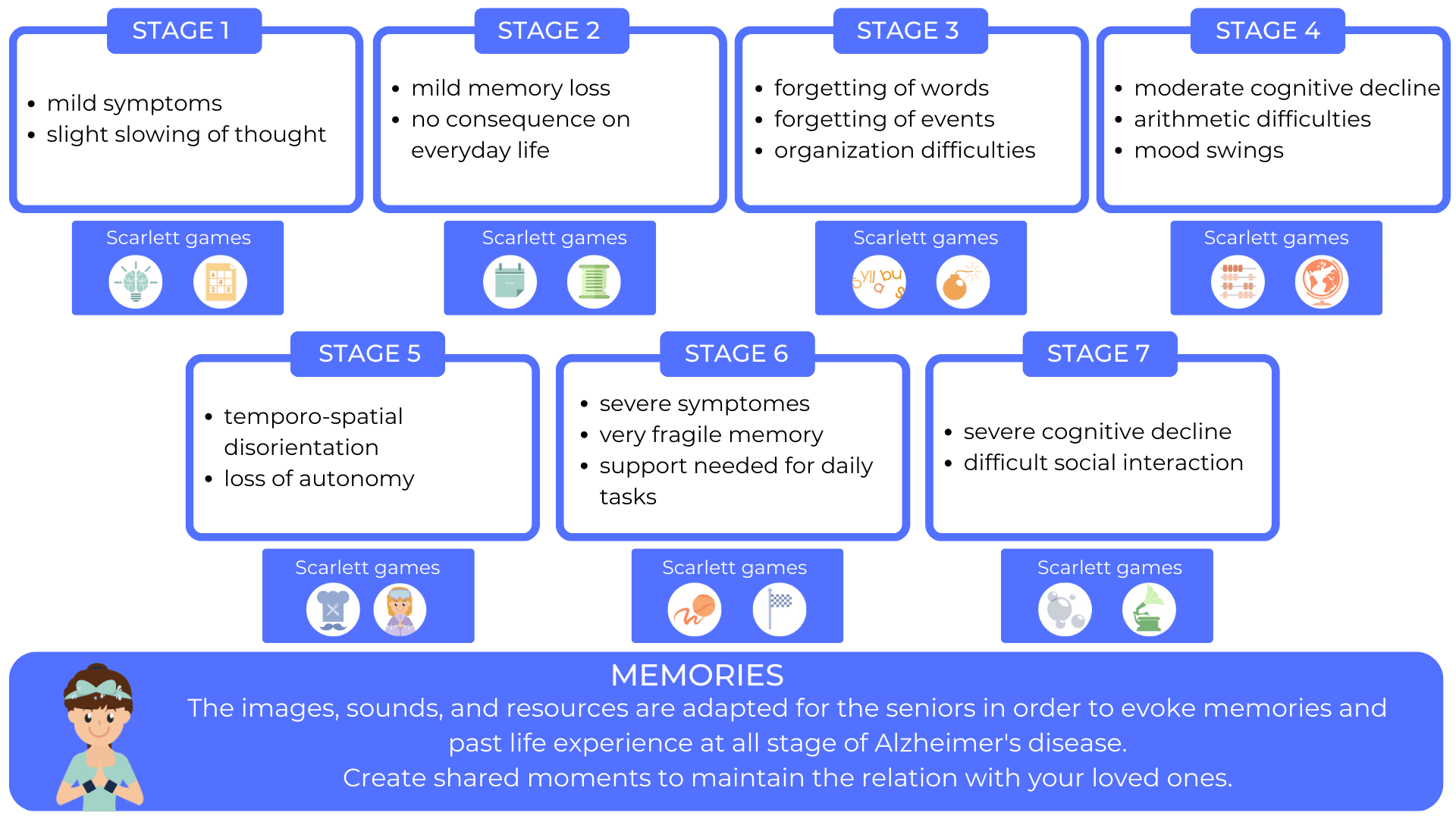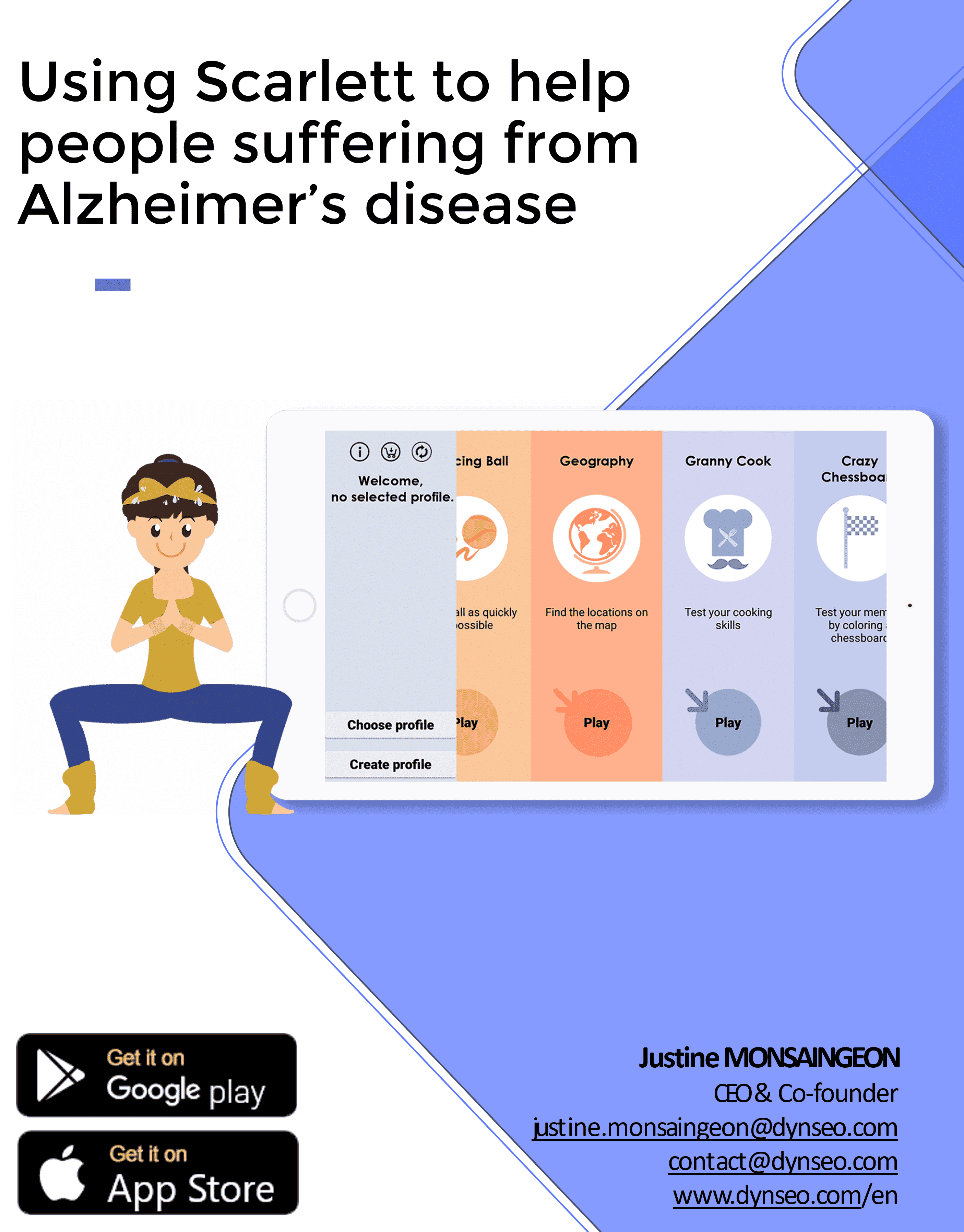Hereditary Alzheimer’s disease is a rare form of Alzheimer’s disease that runs in families from generation to generation. It accounts for around 1 to 5% of all cases of Alzheimer’s disease. Unlike the sporadic form of the disease, which generally develops after the age of 65, hereditary Alzheimer’s disease often manifests itself before the age of 65.
The prevalence of hereditary Alzheimer’s disease varies from population to population, but it is estimated to affect around 200,000 people worldwide. People with this hereditary form of the disease have a risk of developing the disease close to 100% if they inherit the mutated gene responsible for the disease.
Genetic causes of Alzheimer’s disease
Hereditary Alzheimer’s disease is caused by specific genetic mutations that are passed from generation to generation within a family. The genes involved in this hereditary form of the disease include the APP (Amyloid Precursor Protein) gene, the PSEN1 (Presenilin 1) gene and the PSEN2 (Presenilin 2) gene.
These genes are responsible for the production and processing of amyloid proteins, which accumulate in the brains of Alzheimer’s sufferers. Mutations in these genes result in excessive production of amyloid proteins, leading to the formation of amyloid plaques and neuronal degeneration characteristic of Alzheimer’s disease.
Hereditary Alzheimer’s disease is transmitted in an autosomal dominant fashion, meaning that a single parent carrying the genetic mutation has a 50% chance of passing the disease on to his or her children. It also means that each child of an affected parent has a 50% risk of developing the disease.
Symptoms of the Alzheimer’s disease
The first signs of Alzheimer are often similar to those of the sporadic form. Sufferers may experience memory problems, word-finding difficulties, mood swings and sleep disturbances.
However, unlike the sporadic form, symptoms of hereditary Alzheimer’s disease generally appear at an earlier age, often in the forties or fifties. As the disease progresses, sufferers may have difficulty performing everyday tasks, recognizing familiar faces and communicating.
The progression of the disease varies from person to person, but is generally progressive, leading to total loss of autonomy. People with hereditary Alzheimer’s disease often have a shorter life expectancy than those with the sporadic form of the disease.
Genetic testing for hereditary Alzheimer’s disease
| Genetic testing for hereditary Alzheimer’s disease | Description | Cost | Reliability |
|---|---|---|---|
| Genetic predisposition test | Determines whether a person is a carrier of a genetic mutation associated with hereditary Alzheimer’s disease | Approx. £300 | Highly reliable |
| Genetic diagnostic test | Helps confirm the diagnosis of hereditary Alzheimer’s disease in a person presenting symptoms | Approx. £1,000 | Highly reliable |
| Preimplantation testing | Selects embryos that do not carry the genetic mutation associated with hereditary Alzheimer’s disease during in vitro fertilization. | Approx. £5,000 | Highly reliable |
Genetic testing can be used to detect the genetic mutations responsible for hereditary Alzheimer’s disease. These tests can be carried out in people with a family history of the disease, or in those with early symptoms of the disease.
Genetic testing generally involves taking a blood or saliva sample, which is then analyzed in a laboratory to detect specific genetic mutations. Test results may take several weeks.
The implications of the test result can be significant emotionally and for the family. A positive result means that the person has inherited the genetic mutation responsible for the disease and has a high risk of developing it in the future. A negative result means that the person has not inherited the genetic mutation and has a reduced risk of developing the disease.
The risks of transmitting Alzheimer’s disease within families
Prevention options for people at risk

While there is as yet no safe and effective way to prevent hereditary Alzheimer’s disease, there are certain steps that at-risk individuals can take to reduce their risk of developing the disease.
Preventive measures include a healthy lifestyle, such as a balanced diet, regular physical activity, adequate sleep and stress management. It is also recommended to avoid known risk factors for Alzheimer’s disease, such as smoking, alcoholism and exposure to toxic substances.
It’s also important to maintain good mental health by staying socially active, stimulating the brain with intellectual activities and managing stress and anxiety. Some studies also suggest that regular practice of cognitive exercises, such as memory games and puzzles, can help maintain brain health.
The benefits and limitations of these preventive measures may vary from person to person. It is important to consult a healthcare professional for personalized advice on appropriate preventive measures.
Treatments available for hereditary Alzheimer’s disease
Although there is as yet no cure for hereditary Alzheimer’s disease, there are certain medications that can help slow the disease’s progression and relieve certain symptoms.
Drugs commonly used to treat Alzheimer’s disease include acetylcholinesterase inhibitors, which help improve communication between nerve cells in the brain, and NMDA receptor antagonists, which help regulate nerve cell activity.
In addition to drugs, there are also non-drug therapies that can benefit people with hereditary Alzheimer’s disease. These therapies include occupational therapy, music therapy, art therapy and light therapy.
How to manage the risk of Alzheimer’s disease in the family
Managing the risk of Alzheimer’s disease in a family can be a complex challenge. It’s important to make informed decisions and plan ahead for future challenges.
Lifestyle choices, such as adopting a healthy lifestyle and participating in cognitive and social activities, can help maintain brain health and reduce the risk of developing the disease. It’s also important to take care of your mental health by seeking emotional support and getting help from mental health professionals if necessary.
Planning decisions, such as drafting a will, establishing a durable power of attorney for healthcare and financial planning, can also be important to ensure adequate care should the disease develop.
Resources for families affected by hereditary Alzheimer’s disease
Ongoing research into hereditary Alzheimer’s disease
Research into hereditary Alzheimer’s disease is constantly evolving. Numerous studies are underway to better understand the disease’s underlying mechanisms and develop potential new treatments.
Recent advances in research include the identification of new genes involved in the disease, the development of gene therapies to correct the genetic mutations responsible for the disease, and the use of advanced brain imaging techniques to detect early signs of the disease.
The outlook for the future is promising, but it’s important to continue supporting research and raising awareness of hereditary Alzheimer’s disease in order to find effective solutions to prevent and treat this devastating disease.
Conclusion: Hereditary Alzheimer’s disease is a complex illness requiring a multidisciplinary approach. Advances in research offer hope for those affected by the disease and their families. It’s important to take appropriate preventive measures, seek emotional support and plan ahead for future challenges. By supporting research and raising public awareness, we can help find effective solutions to prevent and treat hereditary Alzheimer’s disease.
AND FOR FURTHER INFORMATION
Scarlett, memory games for seniors with dementia
With the SCARLETT adapted play program, your loved ones will be stimulated at their own pace. The games have no timer, no score, so that seniors can rediscover the pleasure of playing. A practical solution for family and professional caregivers.
Supporting someone with Alzheimer’s with the Scarlett program
In this guide, we give you practical advice on how to support, stimulate and bond with a loved one suffering from Alzheimer’s disease or dementia. Useful day-to-day advice to make life easier for family and professional caregivers.
Other articles that might interest you:
The Role of Cognitive Apps in Speech Therapy for Alzheimer’s Patients
Alzheimer’s disease is a progressive neurological disorder that primarily affects memory, thinking, and behavior. As...
Memory Apps for Alzheimer’s: Enhancing Recall in Speech Therapy Sessions
Alzheimer's disease is a progressive neurological disorder that primarily affects memory, thinking, and behavior. As...
Cognitive Rehabilitation Apps for Speech Therapy with Alzheimer’s Patients
In recent years, the landscape of cognitive rehabilitation has evolved significantly, largely due to the advent of...








